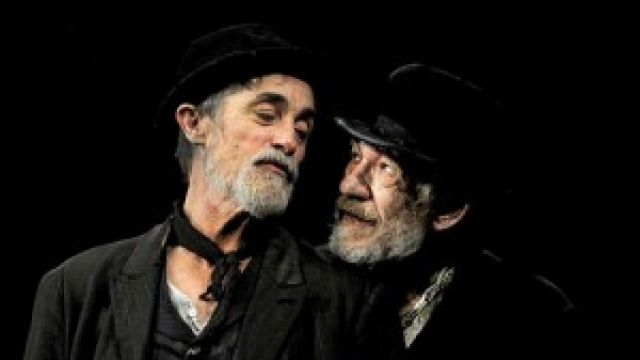Waiting for Godot by Samuel Beckett
Who is Godot? Where is Godot? Why are we all waiting for Godot? I wouldn't want to tell you and spoil the surprise, but I can say that despite knowing you never actually find out that answer, Sir Ian McKellen and Roger Rees made two hours of the most edge of your seat theatre I have ever seen.
Directed by Sean Mathias, the play written by Samuel Beckett tells the story of lifelong friends Vladimir and Estragon, who've known each other so long, they often consider that the poor circumstances in their lives may in fact be due to having known each other at all. The play is timeless, set over 2 full days of sun-up to sun-set, maybe the days are chronological, and maybe they aren't, many questions are posed, but none answered.
McKellen is sheer brilliance in the role of Estragon, as the comic relief in this duo he is the perfect balance to the straight man Vladimir, played with outstanding skill and clarity by Roger Rees. The two-hander work between them is perfectly timed, awkwardly brilliant and masterfully acted by both genius's of the stage, and some of the most compelling live work I have ever seen.
Beckett's play takes a turn for the absurd with the introduction (twice) of characters Pozzo and Lucky played by Matthew Kelly and Brendan O'Hea respectively, and still the four consumate performers give an abundance of energy to hold their characters. O'Hea shines as Lucky through a painfully long moment of logorrhoea in his "think" speach.
The set is very cleverly designed with one required tree placed plainly in the middle growing out of the floor boards, the sides of the proscenium arch are adorned with two large Romanesque archways through which Pozzo and Lucky make all there entrances and exits. These archways cleverly represent the "outside" world, and are also the windows to all of Vladimir and Estragon's hopes and fears. Lighting and sound are used to good effect to show the changing states of both the days length, and the characters emotional states.
In the directors notes, Mathias writes that the they "never consciously tried to make it funny, but the more we played what the lines said, the louder and louder the laughter rang out … " The performances from all four players were so honest and true that consequently this production is just as Mathias said, hilarious.
Paul Rodda
Subscribe to our E-Newsletter, buy our latest print edition or find a Performing Arts book at Book Nook.

